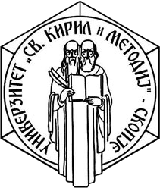| Professor |
Course |
Semester |
ECTS |
|
| 1 | assoc. prof. Ana Madevska Bogdanova, assoc. prof. Marija Mihova, assist. prof. Anastas Mishev, assist. prof. Boro Jakimovski |
Advanced algorithms |
IX |
6 |
| 2 | assist. prof. Boro Jakimovski, elect. assist. prof. Jasen Markovski | Formal methods | IX | 6 |
| 3 | prof. Vancho Kusakatov, prof. Margita Kon-Popovska, assist. prof. Vesna Dimitrievska Ristovska |
Optimization |
IX |
6 |
| 4 |
Elective course |
IX |
6 |
|
| 5 |
Elective course |
X |
6 |
|
| 6 | Elective course | X | 6 | |
| 7 | Elective course | X | 6 |
Smart connected systems (4 + 1)
1. General Information
Postgraduate studies in smart connected systems aim to provide quality and top European education and training to ICT engineers with in-depth knowledge of smart systems connected via the Internet of Things (IoT). Upon completion of their studies, these engineers will be able to take responsible positions in the processes of planning, design, programming, management, testing and monitoring of smart IoT systems and work with various types of the latest embedded technologies, including new IoT business aspects. >
- Name of the proposer: University "Ss. Cyril and Methodius University in Skopje, Faculty of Information Sciences and Computer Engineering - FINKI
- Study Program Name: Academic Second Cycle Studies in Smart Connected Systems
- Scientific-research area: technical-technological
- Field: Computer Engineering & Informatics
- Area: Information Systems and Networks
- The value of postgraduate studies is 60 ECTS or 120 ECTS credits .
- Duration of studies: 2 or 4 semesters .
- One academic year consists of two semesters lasting 30 weeks (1 semester = 15 weeks).
- The first semester consists of subjects, while the second has a smaller number of subjects and is reserved for the final project, ie. for the master's thesis.
- Admission Requirements : Completed undergraduate studies in the field of informatics or computer technology and informatics with a minimum of 240 credits. For study directions that carry less than 240 credits, exams offered in the introductory layer are added.
- Introductory layer : Students who have earned less than 240 credits during their studies are offered a set of differential introductory courses. After their successful realization, the student acquires the right to continue with the second year of postgraduate studies.
- First semester: 3 Mandatory courses and 2 electives, one of which may be from the University list.
- Second semester: 1 Mandatory and 1 elective, which can be from the university list (only if in the first semester the subjects are selected at the Faculty level) and a final project of 18 ECTS
- 1 ECTS credit corresponds to 30 hours of total work engagement
- The number of contact hours is 4
- The academic title or degree obtained after graduation is
- Master in Information Science and Computer Engineering in the field of smart connected systems
2. Studies
Table 3: List of Postgraduate Courses
| РБ | Subject | Semester | M / E | ECTS |
| 1 | Building the Internet of Things and Security | IX | M | 6 |
| 2 | Acquisition and data processing systems | IX | M | 6 |
| 3 | Smart City | IX | M | 6 |
| 4 | Elective | IX | E | 6 |
| 5 | Elective | IX | E | 6 |
| 6 | Developing IoT applications and IoT platforms | X | M | 6 |
| 7 | Elective | X | E | 6 |
| 8 | Master Thesis | X | M | 18 |
The following table shows the electives from the study program
Table 4: Electives
| РБ | New code / Subject | Semester | ECTS | |
| 1 | PS-I-01 Data Analysis from Related Systems | X | 6 | |
| 2 | PS-I-02 Sensory data fusion | IX | 6 | |
| 3 | ПС-E-03 Smart mobility | X | 6 | |
| 4 | PS-I-04 Smart IoT Contracts | IX | 6 | |
| 5 | PS-I-05 Smart Energy Networks | IX | 6 | |
| 6 | PS-I-06 Smart and connected healthcare | X | 6 | |
| 7 | PS-I-07 IoT for Environmental Systems | IX | 6 | |
| 8 | PS-I-08 Open & Related Data | X | 6 | |
| 9 | ПС-E-09 Smart production and monitoring systems | X | 6 | |
| 10 | PS-I-01 Smart Financial Systems and Stock Exchange | IX | 6 | |
| 11 | IT-I-01 5G: Fifth Generation Wireless Mobile Systems | IX | 6 | |
| 12 | IT-I-04 E-business | IX | 6 | |
| 13 | IT-I-11 Smart Sensor Networks | X | 6 | |
| 14 | IT-I-13 Network Virtualization and Cloud Computing | X | 6 | |
| 15 | IT-I-18 Data Science | IX | 6 | |
| 16 | EС-E-21 Sensor-robotic systems | X | 6 | |
| 17 | СE-E-01 Time series analysis and forecasting | IX | 6 | |
| 18 | EI-Z-03 Implementation of Geographic Information Systems | X | 6 | |
The student can choose a subject from the list of offered elective courses from all study programs of the second cycle of studies. The list of offered electives can be found on this link .



